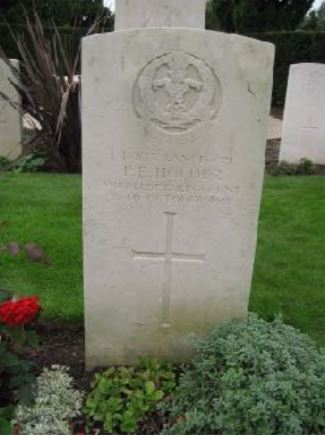29th Battalion, Middlesex Regiment

Percival Ewart Holder (known as Percy) was born at Upton-St-Leonards in either May or July 1886 (records differ). He was the son of George James and Elizabeth Ann Holder (both born about 1858). Oddly, the CWGC ‘Debt of Honour’ register states his father to be ‘William’ (probably confusing him with Percy’s elder brother) and his mother as ‘Annie’. George Holder was a stonemason. By the time of the 1901 Census the couple had had five children (four boys and one girl) and were living in Winchcombe. It has not been possible to trace the family in the 1911 Census as all the children and father George appear to have been lodging elsewhere, in connection with employment.
After completing his education Percy became a ‘domestic page boy’ and on 26 July, when aged 18 he joined the Army, stating his occupation to be an ‘indoor servant’. He signed on for three years ‘with the Colours’ followed by nine in the Reserve. He was posted to the 1st Battalion of the Gloucestershire Regiment (given the number 7673) and served in the UK until 4 February 1907. He then served in India until 24 November 1910, having extended his service with the Colours by an additional four years, to run to 26 July 1911. His period in the Reserve was due to run until 1916 however the outbreak of war intervened and he was recalled to service on 5 August 1914, rejoining the 1st Glosters, who joined the British Expeditionary Force in France on 13 August, being part of 3rd Brigade, 1st Division.
The 1st Glosters took part in the Retreat from Mons and following the halting of the German advance at the Battle of the Marne and subsequent Anglo – French advance, the battalion found itself in the Ypres Salient, where it resisted the German attack at the Battle of Gheluvelt on 29 October 1914. On 1 November the battalion was relieved and withdrew to Inverness Copse, sustaining 76 casualties whilst doing so: Percy Holder was one of these, suffering a gun shot wound to his left forearm. He was sent back to the UK and posted to the strength of the Glosters’ Depot. He was probably utilised in training new recruits and did not return to the Western Front. On 27 July 1916 he was appointed a Lance Corporal and on 29 September of that year transferred to the 29th Battalion, Middlesex Regiment. This was a Works Battalion, formed at Mill Hill, London in July 1916 which became part of the Labour Corps in April 1917.
Percy’s health had been deteriorating since September 1914, when he had contracted pulmonary tuberculosis. This eventually led to his discharge from the Army on 7 May 1917, with a 100% disability pension, his illness fully attributable to his Army service. He left the Army with a ‘very good character’ endorsement. Sanatorium treatment was arranged but did little or no good and he died, presumably from pulmonary tuberculosis on 28 October 1918, aged 32. A notice of death placed in the Gloucestershire Journal of 2 November 1918 states that he died at 9 Hatfield Road, Gloucester (which is in the Tredworth district). He was buried in Gloucester Old Cemetery, where a standard CWGC headstone marks his grave.
Researched by Graham Adams 2 January 2020
